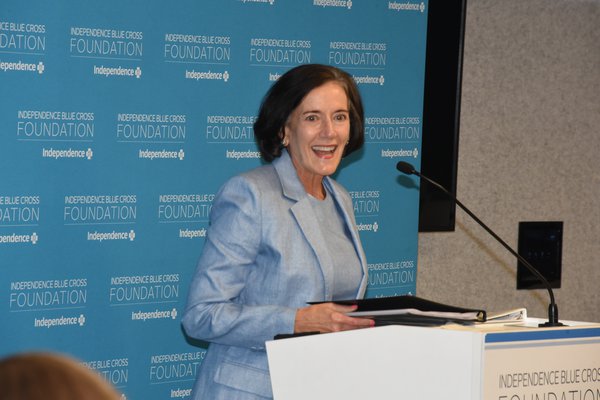As pandemic-era enrollment rules for Medicaid come to an end, Pennsylvania is hoping to prevent a potential health care crisis. Of the 3.7 million people currently on Medicaid in the state, an untold number are at risk of losing health coverage unnecessarily in the coming months.
To help mitigate this risk, the Pennsylvania Department of Human Services says it is streamlining the Medicaid renewal process, educating recipients, and offering affordable health insurance options to those who no longer qualify for the federal benefit. Keeping eligible people on Medicaid is the agency's "top priority for the next year," DHS Director Dr. Val Arkoosh said Monday during at a Center City event discussing the issue of Medicaid renewals.
- MORE HEALTH
- Number of children hospitalized after ingesting marijuana has spiked in recent years, likely due to edibles
- How safe is aspartame? The WHO and FDA take different stances on the sweetener's cancer risk
- Forget New Year's – summer is the perfect time to start healthy habits
Medicaid provides health coverage to millions of low-income adults, elderly people, adults with disabilities and others. Since 2020, federal law has allowed states to keep people enrolled in Medicaid without being as rigid about income requirements and paperwork filing deadlines. This allowed more people to maintain health coverage during the COVID-19 pandemic. In March, this continuous enrollment provision was terminated by new federal legislation.
"Everything has changed," Arkoosh said at the event hosted by the Independence Blue Cross Foundation. "Now that the pandemic is over, we are required by federal policy to return to our pre-pandemic redetermination process."
As a result, as many as 15 million people could lose health coverage nationwide, according to federal government estimates.
In Pennsylvania, there are 3.7 million people enrolled in Medicaid – that's 28% of the state's population – who will need to complete their annual renewal or risk losing health coverage. So far, Arkoosh said she has been "very concerned" about the low response rates to Medicaid renewal requests. In many cases, the renewal paperwork gets lost due to a change of address or simply doesn't get filed because recipients don't realize it's necessary to renew Medicaid coverage.
In short, the coming drop-off in Pennsylvania's Medicaid coverage could be bigger — and more damaging to public health — than it needs to be.
To offset this risk, the state's Department of Human Services is increasing its educational outreach efforts, giving Medicaid recipients an expanded window of 90 days to submit their renewal applications, and connecting newly-ineligible Medicaid recipients with low-cost health coverage plans through Pennie, the Pennsylvania's health coverage marketplace.
"We are encouraging people who think they no longer qualify to go ahead and complete the renewal anyway," Arkoosh said. If they don't, she added, they can automatically set up an account on Pennie, where some have found health care plans for as low as $5 per month.
Often, the issue comes down to a simple lack of awareness, especially with so many new people enrolled in Medicaid coverage since the onset of the pandemic.
In addition to giving Medicaid recipients more notice about renewing, DHS reaching out to recipients via text, email, paid media and even in-person outreach with the assistance of nonprofit partners on the ground within communities most at risk of having low renewal response rates.
The DHS also set up a website dedicated to helping state residents avoid lapses in coverage. Renewal forms can be completed online or filled out by hand and returned by mail. Those seeking help with their renewals can call (866) 550-4355 to complete their form with a representative or go in person to any DHS county assistance office.
CORRECTION: An earlier version of this article, its headline and photo caption misstated how many Medicaid recipients in Pennsylvania need to renew their health insurance coverage this year. All the state's Medicaid recipients need to renew their health coverage annually. The statistic in the article and headline references how many Pennsylvanian's receive Medicaid benefits, which is 3.7 million or about 28% of the state's population.


